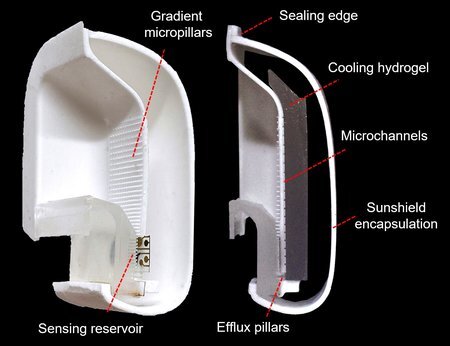The wearable technology sector is experiencing unprecedented growth, extending beyond smartwatches and fitness patches to encompass a broader array of health-monitoring sensors. Among the latest innovations detailed in a recent study published in the prestigious journal Science is a groundbreaking prototype: a smart mask capable of monitoring a spectrum of medical conditions such as asthma and chronic obstructive pulmonary disease (COPD).
Breathe in, Breathe Out: Personalized Health Monitoring Takes a Leap
Caltech’s Wei Gao, a professor of medical engineering and the lead investigator of this pioneering study, emphasizes the importance of monitoring a patient’s breath for evaluating respiratory conditions like asthma. Traditionally, such assessments required patients to visit clinics for sample collection, followed by a tedious waiting period for lab results. However, the advent of the COVID-19 pandemic has normalized mask-wearing, presenting an extraordinary opportunity to utilize masks for remote health monitoring. “We can leverage this increased mask use for remote personalized monitoring to get real-time feedback about our own health in our home or office,” says Gao. “For instance, we could use this information to assess how well a medical treatment may be working.”
Named EBCare, this intelligent mask aims to analyze the chemicals in an individual’s breath. For example, it can detect nitrite levels, a chemical indicator of airway inflammation, providing invaluable insights for asthma sufferers.
The Journey from Concept to Creation
Gao’s ongoing research has already led to the development of various wearable biosensors that analyze human sweat to measure a host of biomarkers, including metabolites, nutrients, hormones, and protein levels. However, his latest challenge was to adapt these capabilities to monitor breath, a task requiring innovative solutions for cooling and condensing the exhaled air into analyzable liquid form.
Traditionally, breath analysis involved external cooling methods using ice buckets or bulky refrigerated units, but the new prototype features an ingenious self-cooling system. By integrating hydrogel evaporative cooling with radiative cooling, the mask efficiently chills the breath, converting it into liquid form. This liquid is then transported to sensors via bioinspired microfluidic capillaries, and the resulting data is wirelessly transmitted to a computer, tablet, or smartphone for real-time analysis.
A Paradigm Shift in Disease Management
According to Wenzheng Heng, the study’s lead author and a graduate student at Caltech, the smart mask marks a significant advancement in the management of respiratory and metabolic diseases. “The breath condensate contains soluble gases and nonvolatile substances in the form of aerosols or droplets, such as metabolic substances, inflammatory indicators, and pathogens,” Heng notes. Drawing inspiration from the way plants transport water using capillary forces, the team devised a low-cost, efficient method of achieving this in a wearable format. Gao highlights that the materials for the smart mask would cost only about $1, making this innovation highly accessible.
Field Testing the Prototype
Initial human trials of the smart mask focused on monitoring breath for nitrite levels, a biomarker for inflammation. The results were promising, accurately detecting inflammation in patients’ airways. Further tests indicated the mask’s capability to measure blood alcohol levels in breath, suggesting potential applications in drinking-and-driving checks or other forms of alcohol consumption monitoring.
Additionally, the mask could detect elevated ammonium levels in saliva, which convert to ammonia gas and closely mirror urea levels in the blood. This functionality could prove useful in the management of kidney disease.
The Road Ahead
“These first studies serve as a proof of concept,” Gao explains. “We want to expand this technology to incorporate different markers related to various health conditions. This is a foundation for creating a mask that functions as a versatile general health-monitoring platform.”
Co-author Harry Rossiter, an investigator at the Lundquist Institute for Biomedical Innovation at Harbor-UCLA and professor of medicine at the David Geffen School of Medicine at UCLA, also emphasizes the transformative potential of the smart mask. “The smart mask platform for EBC harvesting and analysis represents a major advance in the potential to monitor lung health in real-time,” Rossiter says. “That concept, that biosensors for a wide range of compounds may be added in the future, highlights the game-changing potential of the smart mask for health monitoring and diagnostics.”
While the findings are promising, it’s important to consult health professionals for medical advice and diagnosis. This article should not be construed as medical advice; always consult your doctor or primary care provider for personalized health recommendations.
This revolutionary innovation represents a significant leap forward in smart wearable technology, with the potential to fundamentally change how we monitor and manage health conditions from the comfort of our homes.


